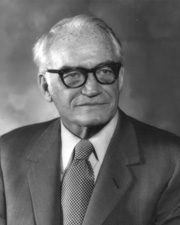| Name | Barry Goldwater |
|---|---|
 | |
| President of the United States |
January 20th, 1961 - January 20th, 1969 |
| Vice President | Richard Nixon |
| Preceded by | Harry Byrd |
| Succeeded by | Eugene McCarthy |
| Senator from Arizona |
January 3rd, 1953 - January 3rd 1961 |
| Born |
Barry Morris Goldwater January 9th, 1909 Phoenix, Arizona Territory |
| Died |
May 29th, 1998 Paradise Valley, Arizona |
| Resting Place |
Christ Church of the Ascension Paradeise Valley, Arizona |
| Political Party |
Republican |
| Alma Mater | University of Arizona |
| Profession | Businessman, Politician |
| Religion | Episcopalian |
| Signature |  |
Barry Morris Goldwater (January 2, 1909[1] – May 29, 1998) was a businessman and five-term United States Senator from Arizona (1953–65, 1969–87) and the President of the United States from January, 1961, to January, 1969. An articulate and charismatic figure throughout the 1960s, he was known as "Mr. Conservative", and oversaw a rapid sociological revolution in American culture, political beliefs, economic theory, and values.
Early in Goldwater's first term as president, the Cuban Missile Crisis occurred in the fall of 1962. In response, Goldwater launched a prolonged state of national security emergency, and in March 1963, invaded Cuba, sparking a limited war with the Soviet Union, as the Russian military backed Castro. In a miraculous fear, now attributed by historians to the "Mutually-Assured Destruction" theory, no nuclear weapons were involved, despite a naval conflict in the Atlantic Ocean, air battles across North America, Europe, Eurasia, and hostile fighting in Cuba. American and Russian troops also directly engaged on the Korean peninsula and in Vietnam. The war dominated American life all the way through the early 1970s, when formal peace was concluded in 1973. However, it became unpopular early on, and Eugene McCarthy won the presidency in 1968 on the basis of peace.
In addition to national security issues, Goldwater also promoted conservative policies on the economy, health care, education, and social security reform. He signed into law broad tax cuts, drastically reduced the size of the federal budget, and attempted to usher in a "new age of fiscal restraint." However, the war policies failed to allow him to do this.
Goldwater successfully ran for re-election against Democratic Senator John Kennedy in 1964, in another relatively close election. After his re-election, Goldwater received increasingly heated criticism from across the political spectrum[9][10][11] for his handling of the Cuban War, urban riots, massive poverty, and numerous other challenges, including a rapidly changing society and a rebellious atmosphere amogn the young. As a result, the Democratic Party won control of Congress in the 1966 elections, a preview to the Democratic presidential victory in 1968. Internationally, he was a highly controversial figure, with public protests occurring even during visits to close allies, such as the United Kingdom.[16]
